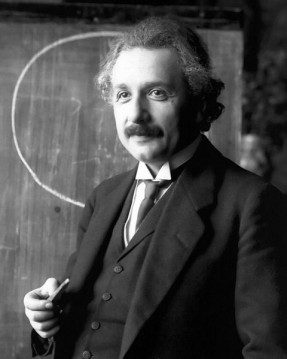
This story goes back to Albert Einstein in 1905, called Einstein’s miracle year. In just that one single year, Einstein published four papers, any one of which would have made the career of any other scientist. Hey, I’d be happy to have a sentence or a numerator in one of his equations! But then between 1905 and 1915, Einstein went on to publish numerous other papers on his theory of relativity for which he is the most famous. What is less known is that during the final 30 years of Einstein’s life, his work was mostly unsuccessful. Those are two words you never hear in the same sentence, Einstein and unsuccessful. That was because he put all his efforts behind the holy grail of science: the theory of everything, or the ToE as it is commonly abbreviated.
In recent years, there’s been a proliferation of scientists throwing entire careers into a venture for the ToE. Perhaps you’ve heard some of the big ideas, such as string theory, quantum gravity, branes, the multiverse, and it gets even wilder from there. What’s going on? Researchers used to concern themselves with boring research you never heard of, like the discovery of the Xi_b baryon or an investigation into the double nucleus of the Andromeda galaxy.
I say it has more to do with psychology than physics. It’s like a deep thirst. Once we understand that elements are comprised of atoms, well, it doesn’t just stop there, does it? We want to know what makes up an atom, then what makes up a nucleus, then a quark, and on and on. Where does it end? Not until we know the ToE. Not until we know everything.
You probably get where this is going. The famous mathematician Blaise Pascal described it this way in his book “Pensees:” There is a God shaped vacuum in the heart of every man which cannot be filled by any created thing, but only by God.
The search for knowledge is in its fundamentals a search for God, for that is the culmination of all knowledge, or the end of science. When we finally reach that pinnacle of humanity, the great ToE, we’ll find that the theology was already there thousands of years ago.









Braaaaaains!
Sorry…that shows just how scientifically astute I am.
I remember back in the late 90’s meeting a scientist and hanging out in a pub while he talked excitedly about string theory. He was an eastern European astrophysicist in Amsterdam, Holland, attending some conference on String Theory. I remember wondering what the hell is he talking about. 😉
String theory was big back in the 90’s. Now most articles i read are saying why string theory won’t work. It’s amazing how things change in 10 years!
Bruce…I remember seeing a special on PBS called the Elegant Universe. It was about String Theory. It’s no longer big? Too bad…I thought it was a cool idea. Well, how did they even know it was strings. Being a musician I sort of get it. How’s it going, Bruce.
Hey Rob- Yeah, I was really big on string theory too. It’s a great idea. I really like the 11 dimensions and all. I’ve read Brian Greene’s book “The Elegant Universe,” and I think I saw that PBS special. There are still a lot of adherents. String theory’s been through some hard times before, so who knows, maybe it will still turn out to be something.
Hi Bruce…wasn’t the whole thesis of the Elegant Universe about an attempted synthesis between General Relativity and Atomic Theory? Is there a new synthesis of these viewpoints on the horizon. Just wondering
Yeah, and it was a pretty cool idea. I think physics is confounded by the discoveries of dark energy and dark matter. They aren’t talking so much about grandiose synthesis between relativity and quantum physics anymore; they’re just trying to figure out some of the basics again.
Look for a discovery of the Higgs boson (the God particle) this summer or maybe the Fall. That will complete the first layer of the Standard Model of particle physics. String theory predicts supersymmetry (another layer beyond the Standard Model), so if we see a glimpse of that in the Large Hadron Collider in Geneva there might be talk of string theory again.
Hi Brice…I remember watching the movie Angles and Demons. It was a good movie. Did you see it? I ask because I think they were talking about the God particle in that film. How’s it going?
I don’t think I saw that movie, at least I don’t remember it. I did read the book, though. If I remember right the premise was based on matter-antimatter annihilation. One of the big questions for physics right now is why the universe is based on matter instead of antimatter, or why any matter exists at all. According to big bang theory, equal amounts of matter and antimatter should have been produced, and they would have annihilated each other and nothing would be left. Good thing that didn’t happen!